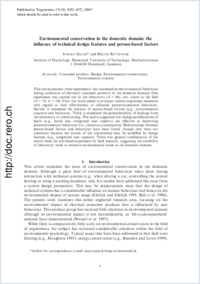Environmental conservation in the domestic domain : the influence of technical design features and person-based factors
- Sauer, Jürgen Université de Fribourg
- Rüttinger, Bruno Institute of Psychology, Darmstadt University of Technology
-
15.08.2004
Published in:
- Ergonomics. - Taylor & Francis. - 2004, vol. 47, no. 10, p. 1053-1072
English
This article presents three experiments that examined proenvironmental behaviour during utilisation of electrical consumer products in the domestic domain. One experiment was carried out in the laboratory (N=48), two others in the field (N=18, N=24). First, the work aimed to evaluate various ergonomic measures with regard to their effectiveness to influence proenvironmental behaviour. Second, it examined the relation of person-based factors (e.g., environmental concern) and behaviour. Third, it examined the generalizability of findings from the laboratory to a field setting. The results suggested that design modifications of kettle (e.g., kettle size, integrated user support) are effective in improving proenvironmental behaviour (i.e., resource consumption). Relationships between person-based factors and behaviour have been found, though they were not consistent because the nature of the relationship may be modified by design features (e.g., integrated user support). There was general confirmation of the results from the lab-based experiment by field research, suggesting the suitability of laboratory work to research environmental issues in the domestic domain.
- Faculty
- Faculté des lettres et des sciences humaines
- Department
- Département de Psychologie
- Language
-
- English
- Classification
- Psychology
- License
-
License undefined
- Identifiers
-
- RERO DOC 8312
- DOI 10.1080/00140130410001686302
- Persistent URL
- https://folia.unifr.ch/unifr/documents/300438
Statistics
Document views: 144
File downloads:
- pdf: 259
